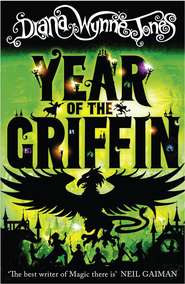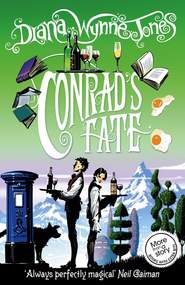По всем вопросам обращайтесь на: info@litportal.ru
(©) 2003-2024.
✖
The Land of Ingary Trilogy
Настройки чтения
Размер шрифта
Высота строк
Поля
“You have mysterious allure,” she told one that was all veiling with hidden twinkles. To a wide, creamy hat with roses under the brim she said, “You are going to have to marry money!” and to a caterpillar-green straw with a curly green feather she said, “You are young as a spring leaf.” She told pink bonnets they had dimpled charm and smart hats trimmed with velvet that they were witty. She told the mushroom-pleated bonnet, “You have a heart of gold and someone in a high position will see it and fall in love with you.” This was because she was sorry for that particular bonnet. It looked so fussy and plain.
Jane Farrier came into the shop next day and bought it. Her hair did look a little strange, Sophie thought, peeping out of her alcove, as if Jane had wound it round a row of pokers. It seemed a pity she had chosen that bonnet. But everyone seemed to be buying hats and bonnets around then. Maybe it was Fanny’s sales talk or maybe it was spring coming on, but the hat trade was definitely picking up. Fanny began to say, a little guiltily, “I think I shouldn’t have been in such a hurry to get Martha and Lettie placed out. At this rate we might have managed.”
There was so much custom as April drew on towards May Day that Sophie had to put on a demure grey dress and help in the shop too. But such was the demand that she was hard at trimming hats in between customers, and every evening she took them next door to the house, where she worked by lamplight far into the night in order to have hats to sell the next day. Caterpillar-green hats like the one the Mayor’s wife had were much called for, and so were pink bonnets. Then, the week before May Day, someone came in and asked for one with mushroom pleats like the one Jane Farrier had been wearing when she ran off with the Count of Catterack.
That night, as she sewed, Sophie admitted to herself that her life was rather dull. Instead of talking to the hats, she tried each one on as she finished it and looked in the mirror. This was a mistake. The staid grey dress did not suit Sophie, particularly when her eyes were red-rimmed with sewing, and, since her hair was a reddish straw colour, neither did caterpillar green nor pink. The one with mushroom pleats simply made her look dreary. “Like an old maid!” said Sophie. Not that she wanted to race off with counts, like Jane Farrier, or even fancied half the town offering her marriage, like Lettie. But she wanted to do something – she was not sure what – that had a bit more interest to it than simply trimming hats. She thought she would find time next day to go and talk to Lettie.
But she did not go. Either she could not find the time, or she could not find the energy, or it seemed a great distance to Market Square, or she remembered that on her own she was in danger from Wizard Howl – anyway, every day it seemed more difficult to go and see her sister. It was very odd. Sophie had always thought she was nearly as strong-minded as Lettie. Now she was finding that there were some things she could only do when there were no excuses left. “This is absurd!” Sophie said. “Market Square is only two streets away. If I run—” And she swore to herself she would go round to Cesari’s when the hat shop was closed for May Day.
Meanwhile a new piece of gossip came into the shop. The King had quarrelled with his own brother, Prince Justin, it was said, and the Prince had gone into exile. Nobody quite knew the reason for the quarrel, but the Prince had actually come through Market Chipping in disguise a couple of months back, and nobody had known. The Count of Catterack had been sent by the King to look for the Prince, when he happened to meet Jane Farrier instead. Sophie listened and felt sad. Interesting things did seem to happen, but always to somebody else. Still, it would be nice to see Lettie.
May Day came. Merrymaking filled the streets from dawn onward. Fanny went out early, but Sophie had a couple of hats to finish first. Sophie sang as she worked. After all, Lettie was working too. Cesari’s was open till midnight on holidays. “I shall buy one of their cream cakes,” Sophie decided. “I haven’t had one for ages.” She watched people crowding past the window in all kinds of bright clothes, people selling souvenirs, people walking on stilts, and felt really excited.
But when she at last put a grey shawl over her grey dress and went out into the street, Sophie did not feel excited. She felt overwhelmed. There were too many people rushing past, laughing and shouting, far too much noise and jostling. Sophie felt as if the past months of sitting and sewing had turned her into an old woman or a semi-invalid. She gathered her shawl round her and crept along close to the houses, trying to avoid being trodden on by people’s best shoes or being jabbed by elbows in trailing silk sleeves. When there came a sudden volley of bangs from overhead somewhere, Sophie thought she was going to faint. She looked up and saw Wizard Howl’s castle right down on the hillside above the town, so near it seemed to be sitting on the chimneys. Blue flames were shooting out of all four of the castle’s turrets, bringing balls of blue fire with them that exploded high in the sky, quite horrendously. Wizard Howl seemed to be offended by May Day. Or maybe he was trying to join in, in his own fashion. Sophie was too terrified to care. She would have gone home, except that she was halfway to Cesari’s by then. So she ran.
“What made me think I wanted life to be interesting?” she asked as she ran. “I’d be far too scared. It comes of being the eldest of three.”
When she reached Market Square, it was worse, if possible. Most of the inns were in the Square. Crowds of young men swaggered beerily to and fro, trailing cloaks and long sleeves and stamping buckled boots they would never have dreamed of wearing on a working day, calling loud remarks and accosting girls. The girls strolled in fine pairs, ready to be accosted. It was perfectly normal for May Day, but Sophie was scared of that too. And when a young man in a fantastical blue and silver costume spotted Sophie and decided to accost her as well, Sophie shrank into a shop doorway and tried to hide.
The young man looked at her in surprise. “It’s all right, you little grey mouse,” he said, laughing rather pityingly. “I only want to buy you a drink. Don’t look so scared.”
The pitying look made Sophie utterly ashamed. He was such a dashing specimen too, with a bony, sophisticated face – really quite old, well into his twenties – and elaborate blond hair. His sleeves trailed longer than any in the Square, all scalloped edges and silver insets.
“Oh, no thank you, if you please, sir,” Sophie stammered. “I – I’m on my way to see my sister.”
“Then by all means do so,” laughed this advanced young man. “Who am I to keep a pretty lady from her sister? Would you like me to go with you, since you seem so scared?”
He meant it kindly, which made Sophie more ashamed than ever. “No. No thank you, sir!” she gasped and fled away past him. He wore perfume too. The smell of hyacinths followed her as she ran. What a courtly person! Sophie thought, as she pushed her way between the little tables outside Cesari’s.
The tables were packed. Inside was packed and as noisy as the Square. Sophie located Lettie among the line of assistants at the counter because of the group of evident farmers’ sons leaning their elbows on it to shout remarks to her. Lettie, prettier than ever and perhaps a little thinner, was putting cakes into bags as fast as she could go, giving each bag a deft little twist and looking back under her own elbow with a smile and an answer for each bag she twisted. There was a great deal of laughter. Sophie had to fight her way through to the counter.
Lettie saw her. She looked shaken for a moment. Then her eyes and her smile widened and she shouted, “Sophie!”
“Can I talk to you?” Sophie yelled. “Somewhere,” she shouted, a little helplessly, as a large, well-dressed elbow jostled her back from the counter.
“Just a moment!” Lettie screamed back. She turned to the girl next to her and whispered. The girl nodded, grinned, and came to take Lettie’s place.
“You’ll have to have me instead,” she said to the crowd. “Who’s next?”
“But I want to talk to you, Lettie!” one of the farmers’ sons yelled.
“Talk to Carrie,” Lettie said. “I want to talk to my sister.” Nobody really seemed to mind. They jostled Sophie along to the end of the counter, where Lettie held up a flap and beckoned, and told her not to keep Lettie all day. When Sophie had edged through the flap, Lettie seized her wrist and dragged her into the back of the shop, to a room surrounded by rack upon wooden rack, each one filled with rows of cakes. Lettie pulled forward two stools. “Sit down,” she said. She looked in the nearest rack, in an absent-minded way, and handed Sophie a cream cake out of it. “You may need this,” she said.
Sophie sank on to the stool, breathing the rich smell of cake and feeling a little tearful. “Oh, Lettie!” she said. “I am so glad to see you!”
“Yes, and I’m glad you’re sitting down,” said Lettie. “You see, I’m not Lettie. I’m Martha.”
CHAPTER TWO In which Sophie is compelled to seek her fortune (#ulink_099e1b24-ddaf-5054-a26e-a8d690988b6c)
“What?” Sophie stared at the girl on the stool opposite her. She looked just like Lettie. She was wearing Lettie’s second-best blue dress, a wonderful blue that suited her perfectly. She had Lettie’s dark hair and blue eyes.
“I am Martha,” said her sister. “Who did you catch cutting up Lettie’s silk drawers? I never told Lettie that. Did you?”
“No,” said Sophie, quite stunned. She could see it was Martha now. There was Martha’s tilt to Lettie’s head, and Martha’s way of clasping her hands round her knees with her thumbs twiddling. “Why?”
“I’ve been dreading you coming to see me,” Martha said, “because I knew I’d have to tell you. It’s a relief now I have. Promise you won’t tell anyone. I know you won’t tell if you promise. You’re so honourable.”
“I promise,” Sophie said. “But why? How?”
“Lettie and I arranged it,” Martha said, twiddling her thumbs, “because Lettie wanted to learn witchcraft and I didn’t. Lettie’s got brains, and she wants a future where she can use them – only try telling that to Mother! Mother’s too jealous of Lettie even to admit she has brains!”
Sophie could not believe Fanny was like that, but she let it pass. “But what about you?”
“Eat your cake,” said Martha. “It’s good. Oh, yes, I can be clever too. It only took me two weeks at Mrs Fairfax’s to find the spell we’re using. I got up at night and read her books secretly, and it was easy really. Then I asked if I could visit my family and Mrs Fairfax said yes. She’s a dear. She thought I was homesick. So I took the spell and came here, and Lettie went back to Mrs Fairfax pretending to be me. The difficult part was the first week, when I didn’t know all the things I was supposed to know. It was awful. But I discovered that people like me – they do, you know, if you like them – and then it was all right. And Mrs Fairfax hasn’t kicked Lettie out, so I suppose she managed too.”
Sophie chomped at cake she was not really tasting. “But what made you want to do this?”
Martha rocked on her stool, grinning all over Lettie’s face, twirling her thumbs in a happy pink whirl. “I want to get married and have ten children.”
“You’re not old enough!” said Sophie.
“Not quite,” Martha agreed. “But you can see I’ve got to start quite soon in order to fit ten children in. And this way gives me time to wait and see if the person I want likes me for being me. The spell’s going to wear off gradually, and I shall get more and more like myself, you see.”
Sophie was so astonished that she finished her cake without noticing what kind it had been. “Why ten children?”
“Because that’s how many I want,” said Martha.
“I never knew!”
“Well, it wasn’t much good going on about it when you were so busy backing Mother up about me making my fortune,” Martha said. “You thought Mother meant it. I did too, until Father died and I saw she was just trying to get rid of us – putting Lettie where she was bound to meet a lot of men and get married off, and sending me as far away as she could! I was so angry I thought, Why not? And I spoke to Lettie and she was just as angry and we fixed it up. We’re fine now. But we both feel bad about you. You’re far too clever and nice to be stuck in that shop for the rest of your life. We talked about it, but we couldn’t see what to do.”
“I’m all right,” Sophie protested. “Just a bit dull.”
“All right?” Martha exclaimed. “Yes, you prove you’re all right by not coming near here for months, and then turning up in a frightful grey dress and shawl, looking as if even I scare you! What’s Mother been doing to you?”
“Nothing,” Sophie said uncomfortably. “We’ve been rather busy. You shouldn’t talk about Fanny that way, Martha. She is your mother.”
“Yes, and I’m enough like her to understand her,” Martha retorted. “That’s why she sent me so far away, or tried to. Mother knows you don’t have to be unkind to someone in order to exploit them. She knows how dutiful you are. She knows you have this thing about being a failure because you’re only the eldest. She’s managed you perfectly and got you slaving away for her. I bet she doesn’t pay you.”
“I’m still an apprentice,” Sophie protested.
“So am I, but I get a wage. The Cesaris know I’m worth it,” said Martha. “That hat shop is making a mint these days, and all because of you! You made that green hat that makes the Mayor’s wife look like a stunning schoolgirl, didn’t you?”
“Caterpillar green. I trimmed it,” said Sophie.
“And the bonnet Jane Farrier was wearing when she met that nobleman,” Martha swept on. “You’re a genius with hats and clothes, and Mother knows it! You sealed your fate when you made Lettie that outfit last May Day. Now you earn the money while she goes off gadding—”
“She’s out doing the buying,” Sophie said.











